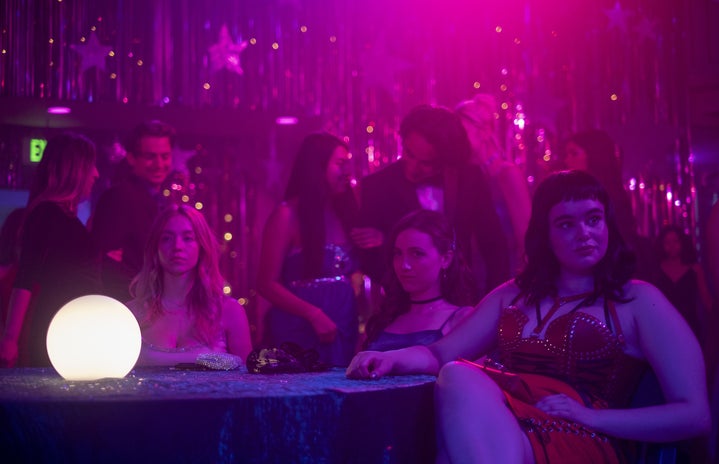People say horrible things about each other. I used to believe that the ability to lavish someone with sweet words then swiftly berate their character to the next person who will listen was simply immoral. Now, I see it as a skill set—the ones who gossip sloppily get caught. They are characterized as evil beasts and banished for as long as their nasty words linger in the brains of their comrades. The ones who are meticulous—who are worldly enough to foresee their confidante’s next move as they would a sudden summer rainstorm—may be able to get away with murder or more. “More” being the dark art of talking shit while presenting as angelic, virtuous, and upstanding.
Everyone talks shit. Some like to sugarcoat their bitter exclamations as “small issues that need to be voiced,” as if such issues, unsaid, might cause the relationship to combust and burn as briskly as a backwards-lit cigarette. They will disguise their unsolicited criticism with doe eyes and wash their hands of responsibility before getting into the good stuff. Their secular confessor may listen squeamishly, feed into the bullshit, or capitalize off the weakness of their comrade by whining about someone they too secretly despise.
Others don’t care. They will wrench, jerk, and tear apart the building blocks that make up the psyches of those close to them, then turn around and crack a pristine smile to the person they just figuratively beat to a pulp. They will go out to coffee with enemies they have yet to confront—possibly even picking up the tab to personify the selfless, altruistic character they pretend to be. They know it’s exhausting to maintain a bogus image of oneself. Those who are successful understand what they are. They spy the rotting fruit in their garden of disposition. They recognize the rancid stench of dishonesty that wafts from their disingenuous tongues. They consume their own thoughts as one might a peach far past its prime; instead of eating around the supple bruises, they ingest the entire peach without apprehension. They accept the disturbed, the warm and loving, the illusory, the despondent thoughts—they accept them all. For those who are conscious of their evil, life is easier.
I spent many years reeling from the blows of people’s words; grieving over the presumption that I was so acutely unlikeable. It’s not like I put myself on a pedestal—I mean yes, I believed I was funny, intelligent, well-rounded, confident—until, that is, I was released from the harbor of my solicitous parents and cast into a sea of power-hungry students. After too many hits to the cavity I stored my confidence in, that confidence began to ooze. Without it, I was none of the things I once was. When my classmates heard my jokes, their giggles rang as hollow in my ears as the laugh tracks played on dusty sitcoms. I began to disclaim my own intelligence, insisting that I was “bad at math” before the teacher even introduced us to the extremely comprehensible topic of the day. I was no longer well-rounded because embarrassment squelched my inclination to explore new interests. Kids were mean, but I was meaner. I was mean enough to doubt myself, to let those who knew nothing about me dilute the carefully-curated self-portrait that I had doted on for years and hung in an ornate gold frame above my headboard. I shunned my essential self for much too long. I rejected my quirks until quirks became trendy, and at that point I forgot what they were.
By the time I was an older kid, a middle-school student, I began to despise anything that separated me from the Lilly Pulitzer-clad girls in my homeroom class. I was too tall and my hair was too curly. My parents were too divorced. I had one too many places of residence. My voice was too loud and the lunches my mother packed me—inspired by her love for European cuisine and her disdain for white bread—were too unconventional. I wished I fit into a family that would most definitely be scouted out to appear on the cover of Architectural Digest, if not a ski brochure in Aspen. I found no beauty in imperfection.
Of course, the things people said about me were not things I refrained from saying about other people. I too was a beast in disguise, a witch in an ivory, lace-trimmed petticoat. I pitied myself while I verbally tore others down as quickly as raindrops descend a misty car window. Nevertheless I believed that I was better than the rest. That my words were less poisonous, and deserved less contempt than the ones shamelessly muttered by my peers—all because I was good and they were bad. I was unhappy with myself, so I was good. I had to trudge between childhood homes like a nomad, so I was good. I wanted to give back, I wanted to help people, so I was good.
Freedom came to me when I realized that I wasn’t good. I rolled in my newfound understanding as I had in piles of freshly dried bed sheets when I was a small child. I spun in the rain under a luminescent, blue summer sky. I got my clothes wet, I got my hair dirty. Evil brought me peace while purity brought me sorrow. I sensed that I was less evil when I realized I could be evil—that I could use the spite that sometimes swelled across my chest, shot up my throat, and burst through my ever-pursed lips to understand who I wanted to be. I found it diabolically empowering to accept my out-of-pocket thoughts, my acts of intolerance. I could sift through those who drifted around me—some who avowed their sins and some who did not. I found it was simply easier to be around people who did. I love evil people, and evil people love me.

